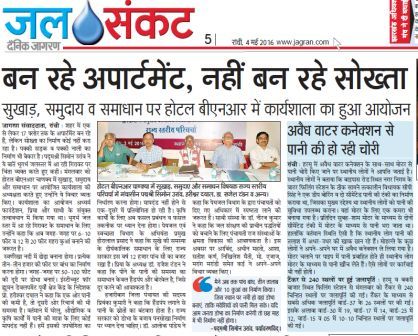| Date 03-May-2016 to 04-May-2016 |
Location Ranchi, Jharkhand |
Format Sub National |
As part of the advocacy efforts under the project Decentralised Drinking Water Security in Jharkhand, PRIA, Arghyam and SATHEE organised a state level consultation, “Sukhad, Samuday aur Samadhan”, on 3 May 2016 at Ranchi, the state capital of Jharkhand. Seventy-five participants, including representatives from CSOs, panchayati raj institutions, government and academia, participated. The consultation was presided by Padma Shri Simon Uraon and Engineer-in-Chief (DWSD) Heera Lal Prasad. Dr. Rajesh Tandon (President, PRIA), Dr. Harishwar Dayal (Professor, Institute of Human Development, Ranchi) and Mrs. Priyanka Kumari (Zilla Parishad Member, Hazaribag) were also on the panel.
Shri Simon Uraon observed that the capacity of land (soil) to absorb rain water has reduced because of the increasing number of concrete structures (road, houses, etc.) in rural areas. Excessive drilling of land and installation of hand pumps are damaging ground water sources, adversely impacting other water bodies.
“Let us change this mind-set that prefers tube wells,” said Dr. Rajesh Tandon, President, PRIA. He likened it to a prescription advising injections when medicines could cure an ailment.
The consultation in particular highlighted how communities can rejuvenate their water sources by making micro plans and structures for water harvesting, based on the experiences of PRIA to promote decentralized water planning in Sahibganj district for the past 3 years. The preparation and fulfilment of such plans requires the support of the state machinery. The Department of Drinking Water is responsible for providing drinking water to the community, but has failed in this respect, especially in tribal areas. The department has not been able to support the plans drafted by the community as there is ambiguity regarding who is responsible to include these community plans into district/department plans. Currently, the Village Water and Sanitation Committees (VWSCs), who are supposed to take care of all water related issues, lack the technical capacities to perform this function.
Civil society practitioners brought forth the issue of how the provision for making a detailed project report (DPR) creates hurdles in the successful implementation of the National Rural Drinking Water Project (NRDWP). Since community engagement remains low during DPR preparation, they do not own the infrastructure created by agencies under such programmes. Many participants highlighted the need for emphasising surface water rather than overexploitation of ground water sources, preventing excessive and inequitable use of water through a system of allocation, reuse of water, changes in agricultural practices, complementing traditional knowledge with modern science in order to overcome the current challenges, the importance of repackaging and communicating traditional knowledge to promote community based decentralized drinking water security, and convergence between departments to simplify processes.
